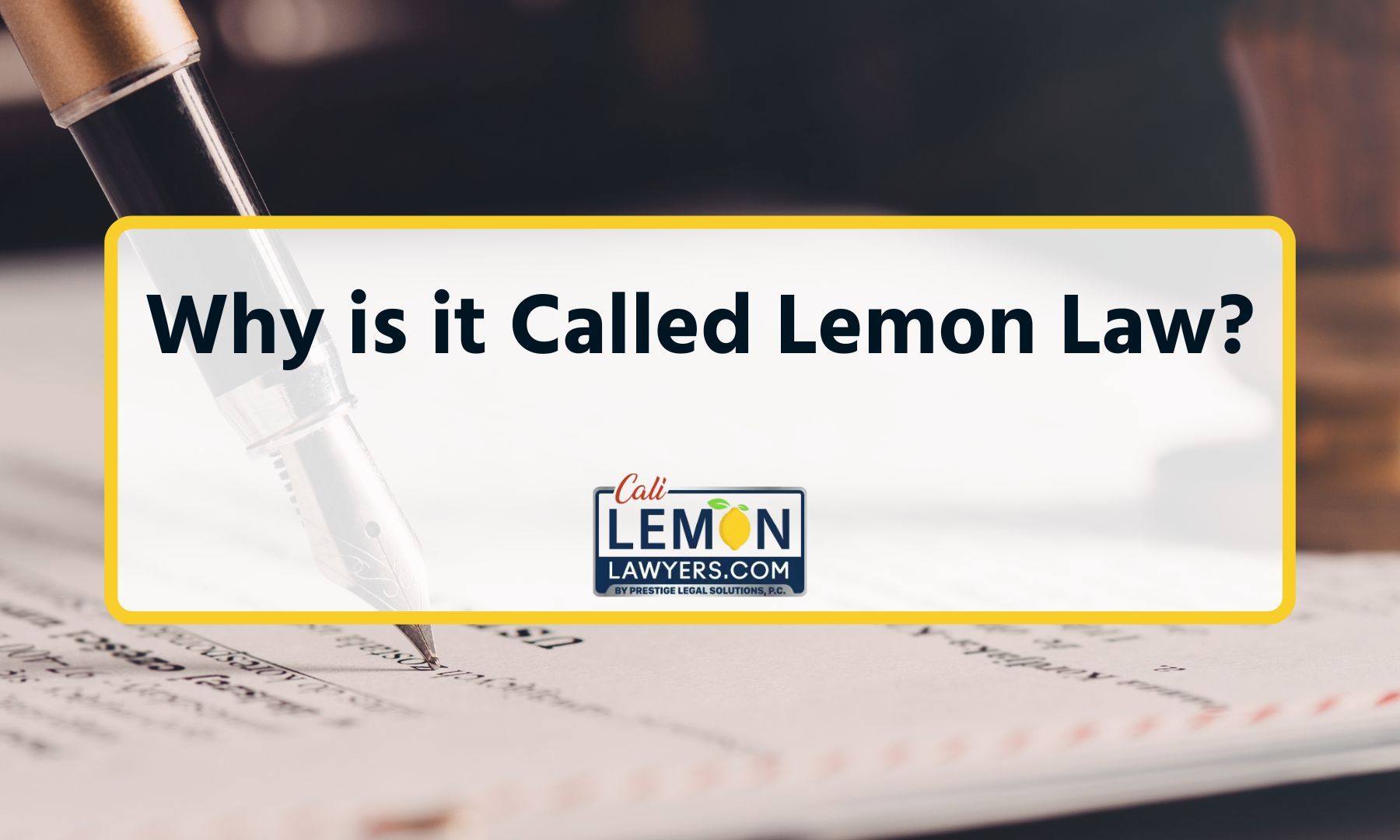
Why is it Called Lemon Law?
Imagine spending $50,000 on the purchase of your dream truck only to face a defect that can’t be fixed even after a reasonable number of attempts. This was the situation for many consumers until the creation of the Lemon law.
The Lemon law primarily protects consumers in the case of a purchase of a lemon vehicle. Whether it’s a new vehicle or a leased vehicle, lemon laws protect consumers by ensuring they receive compensation if they can prove that their car is a lemon.
Here at Cali Lemon Lawyers, we’re a team of dedicated lemon law attorneys committed to helping consumers like you get the compensation they deserve. With over 40,000 case reviews and thousands of satisfied lemon law clients, we have the knowledge and experience to help you.Contact Cali Lemon Lawyers today! ¿Hablas Español? Contáctenos ahora para recibir más información.
But why is it called lemon law? In this blog post, we will explore the origin of the term lemon law, the evolution of lemon laws, the impact of lemon laws on car owners, and the criticisms and limitations of California lemon law.
What is the Lemon Law?
Lemon law is a federal government and state statute that protects consumers who purchased defective vehicles. By offering various forms of legal remedies to consumers who have acquired substandard vehicles, Lemon Law ensures that you’re not stuck with faulty vehicles without some commensurate relief.
The purpose of the Lemon Law is to protect consumers’ rights and hold manufacturers accountable for the implementation of their warranty claims. Here, the manufacturer is required to refund, compensate, or repurchase the defective vehicle if certain criteria are met.
The Origin of the Term ‘Lemon’
The sour and bitter taste of the lemon fruit made the term “lemon” to symbolize disappointment, dissatisfaction, or frustration. Hence, the term was adopted in the 1900s to depict a product of substandard quality.
Criminals also use it as a slang to describe someone who is gullible or susceptible to victimization.
In the 1960s, “lemon” became popular in the automobile industry, referring to a malfunctioning or defective car. The term was later solidified by the enactment of the Magnuson-Moss Warranty Act, as it refers to faulty vehicles as lemons. The term is now widely used beyond the automobile context, incorporating various consumer goods such as appliances and electronic gadgets that are faulty.
History of the Lemon Law
The Lemon Law came into existence in the 1970s as a direct result of consumers’ reactions and complaints against defective automobiles. Before then, the Uniform Commercial Code (UCC) was published to simplify commercial transactions and protect the seller’s and consumer’s rights. The Uniform Commercial Code was not a federal law but was adopted by most states.
However, the UCC did not adequately address the consumer’s frustration following the continued sales of faulty vehicles by dealers. Consequently, the federal government enacted the Magnuson-Moss Warranty Act (Federal Lemon Law) in 1975. Connecticut was the first state to enact the Magnuson-Moss Warranty Act Lemon law in 1982 after John Woodcock, a representative in the Connecticut legislature, introduced the law before the State Assembly.
In 1984, California developed its lemon law known as Song-Beverly Consumer Warranty Act. The law applies both to new and used vehicles which are still under the manufacturer’s warranty coverage.
Under the California Lemon law, you’re entitled to a refund or replacement if your vehicle has a defect that significantly impacts it’s value, use, or safety, and after a reasonable number of attempts to repair the defect has failed.
Currently, every state in the United States has its state lemon law with significant variations in the specifics of the provisions. For example, California lemon law has a maximum timeframe and mileage of 18 months or 18,000 respectively, whichever comes first. In North Carolina, the maximum timeframe and mileage is 24 months and 24 miles, whichever comes first. Also, different states require different numbers of repair attempts and other relevant criteria.
The Evolution of Lemon Laws
The modern lemon law was shaped by many factors, including legal cases, federal and state laws, and advocacy groups. One of the key legal cases is the Macpherson v Buick Motor Co., decided in March 1916, where the court ruled that the responsibility of an automobile company for a defective product extends beyond the immediate purchaser.
Consumer advocacy groups such as the National Association of Consumer Advocates (NACA) and Consumer Actions have played crucial roles in strengthening the lemon laws. This is because they help to raise awareness of consumer rights and advocate for legislation that protects the consumers who purchase defective products.
Impact of Lemon Laws on Car Owners
The introduction of state lemon laws have had several effects on car owners and even manufacturers and dealerships. Some of the most common impacts include:
1. Consumers Protection and Remedies Against Faulty Vehicles
As a car owner, a lemon law claim can help you seek remedies, such as replacement, refund, and compensation for the repairs of a lemon car. This relieves you of the financial burden, ensuring you’re not at loss due to a faulty vehicle that is not primarily your faulty.
2. Confidence and Peace of Mind
Knowing you’re protected by the lemon law gives you peace of mind. You feel confident when making your purchase, especially when investing in a higher value or technologically advanced vehicle.
3. Encourages Quality Manufacturing
Lemon law holds manufacturers accountable for defective vehicles and compels them to compensate consumers for selling flawed products. This encourages them to adhere to high standard of quality in the manufacturing process.
4. Resale Value Transparency
Vehicles that are branded as “lemons” may have a lower resale value. While this is a disadvantage for those selling such a vehicle, it also provides transparency for potential buyers about the vehicle’s history.
5. Awareness of Consumer Rights
State lemon laws raises awareness among consumers about their rights when purchasing a vehicle. This knowledge can lead to more informed buying decisions and a better understanding of what remedy is obtainable if issues arise.
Criticisms and Limitations of Current California Lemon Laws
Despite its intended purpose and functions, lemon law still faces criticisms and limitations. One of the criticisms of the California Lemon Law is that it only empowers vehicle users to enforce the terms of their factory warranty. In other words, if a consumer discovers fault after the warranty expiration, the law has no remedy for them.
Another criticism and limitation is that California lemon law does not apply to cars bought at private sales. Many individuals prefer private sales as it’s cheaper, saves them from dealing with pushy sales staff, and involves less paperwork. However, once you close the deal, every flaw present in the car will be fixed at your expense.
Conclusion
Lemon law is a federal and state law that ensures recourse for consumers who purchased defective vehicles. It’s one of the popular consumer protection laws majorly in the automobile context. Consumer protection laws are essential as they hold manufacturers accountable for defective products and empower consumers to seek redress in the event of the purchase of defective products.
Is your car a lemon? Cali Lemon lawyers are ready to help you get the compensation you deserve. We know the ins and outs of the California Lemon Law, and we’ll work tirelessly to make sure your case is handled correctly, efficiently, and cost-effectively. Contact us now for a free consultation or look up our comprehensive resources on lemon law to learn everything you need to know to file a lemon law claim.




